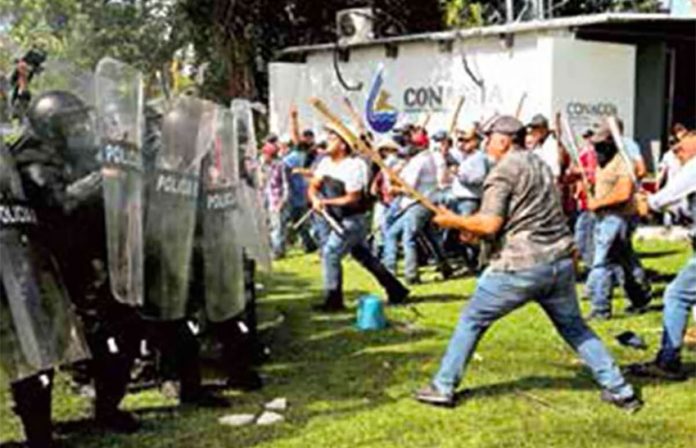Farmers in Chihuahua who have been dealing with water shortages for years reached a breaking point once again Tuesday after the National Water Commission (Conagua) allegedly violated an agreement with ranchers by diverting water from the La Boquilla dam to the United States.
When authorities refused to close the floodgates, an estimated 5,000 farmers stormed the dam, attacking members of the National Guard with Molotov cocktails, sticks and rocks. Guardsmen clad in riot gear fought back by launching tear gas in a failed attempt to retake the water facility and were forced to withdraw.
“For us, it is a great satisfaction, something to be proud of, (and) a triumph for the people in saving the water,” said Abel Alvarado Martínez, the owner of a bakery in a nearby town, after National Guardsmen withdrew.
The tense situation is the result of a problem that has been brewing for several years in Chihuahua and relates to a 1944 water treaty with the United States and a drought in that state that has farmers struggling to irrigate their crops.
Conagua officials had agreed to limit the amount of water sent north of the border, but instead the quantity was increased last week as pressure mounted from the United States to abide by the terms of the treaty.

Mexico has fallen behind in the amount of water it must send north and owes the U.S. 426 million cubic meters, which must be paid by October 24. Payments are made by releasing water from dams on the Mexican side of the border.
The water treaty has become a sensitive political issue in northern Mexico as violence continues to erupt.
Protests at the dam also occurred in January, February, and March when angry farmers angry torched four National Guard vehicles and two Conagua vehicles in Delicias, a city 100 kilometers north of the dam.
In July, 17 people were arrested at a water protest in which at least a dozen cars, toll booths and state and federal government offices were set on fire. Police seized vehicles, baseball bats, Molotov cocktails and other weapons used in the incident.
Farmers say 52 of Chihuahua’s 67 municipalities are in a state of drought. Governor Javier Corral has pledged to accompany farmers to a meeting to discuss the issue with President López Obrador, However, Corral says, the president refuses to see him or take his call.
López Obrador has advocated paying off the debt, noting that according to the treaty Mexico receives four times more water from the Colorado River than it contributes to the Rio Grande area. He has also blamed the protests on political opponents within the National Action Party.
In the past, Mexico has delayed its payments in the hope that tropical storms that periodically enter the Gulf of Mexico will create an unforeseen surplus of water. But even though Hurricane Hanna made landfall in Texas last July, the storm’s rains weren’t intense enough to fill Chihuahua’s dams.
Last week, López Obrador proposed that the water allocation scheme should be reviewed by the United Nations, and warned that Mexico could face sanctions from the United States if it doesn’t pay its water debt, especially with the upcoming presidential elections.
“I agree with international treaties, they must be respected,” bakery owner Alvarado said. “But if we do not have what they require, how are we going to pay?”
Source: Infobae (sp), Reuters (en)
